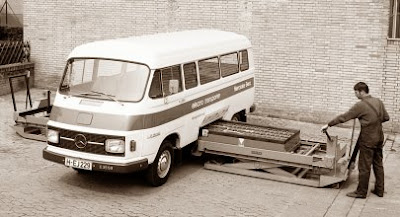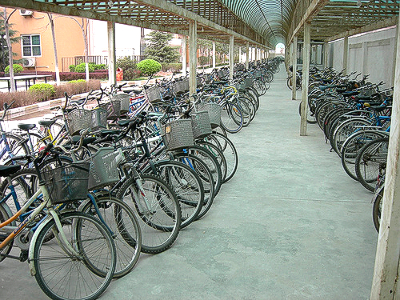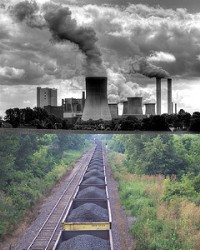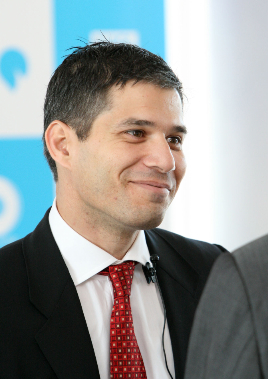transportation
-
Put the book down and get on your bike
Manifesto: (n) a written statement declaring publicly the intentions, motives or views of its issuer. See the Communist Manifesto, avoid The Cyclist’s Manifesto. Courtesy Falcon PressOf all the cycling books to read in honor of National Bike Month, The Cyclist’s Manifesto is better left on the bike rack. Though the author believes he is making […]
-
Electric cars get better mileage
From a study published in this week’s Science Express ($ub Req’d): Bioelectricity produces an average 81% more transportation kilometers and 108% more emissions offsets per unit area cropland than cellulosic ethanol… Given the limited area of land that is available to grow biofuels crops without causing direct or indirect land use impacts, bioenergy applications should […]
-
Shai Agassi: Green’s Steve Jobs
The more you talk to Shai Agassi, the more the Steve Jobs comparison seems apt. Shai AgassiCourtesy Better PlaceLike his fellow Silicon Valley impresario, Agassi, the founder of electric car infrastructure startup Better Place, is as much a green-tech visionary as entrepreneur bent on cashing in on the “Next Big Thing.” Just as Jobs elegantly […]
-
U.K. subsidizes EVs, Amory Lovins talks trucks, and more green auto news
Photo by Sara Barz. Last Thursday, the UK government announced it would offer British citizens subsidies of 2,000-5,000 pounds ($2,900-7,500) for electric vehicles. To facilitate the adoption of electric vehicles, the government will set aside 20 million pounds ($30 million) to invest in electric-vehicle charging stations in city centers and high-traffic regions. This is welcome […]
-
A shopping mall becomes a city
The poor shopping mall. That once impenetrable fortress now seems as susceptible to the ailing economy as the rest of us. Vacancies are at an all-time high. Dead and dying malls continue to plague the landscape. And, perhaps worst of all, the mall has transformed from an icon of American life — see Fast Times […]
-
Hydrogen fuel-cell car wins 2009 World Green Car award
Honda FCX Clarity.Photo courtesy of the New York International Auto Show.Is the Honda FCX Clarity really the world’s greenest car? According to the world’s leading automotive journalists, it is. Thursday morning they gave the hydrogen-fueled Clarity the World Green Car award at the New York auto show. But at my table, after the award was […]
-
Sustainable funding for sustainable infrastructure
This past Friday, Princeton University's PRIOR Center and New York University's Rudin Center convened a conference on what's next in transportation. The speakers, who included Mort Downey, former Deputy Secretary of Transportation and leader of the Obama transition team for transportation; Tony Shorris, former head of the New York and New Jersey Port Authority; current PA chairman Anthony Coscia; and others, agreed that we are at a crossroads in transportation policy.
On the one hand, there has never been more enthusiasm for new modes of transportation such as high-speed rail and new approaches such as vehicle mileage tolling and congestion pricing. Billions in the stimulus bill and the Obama budget for rail have set off a frenzy of excitement about building high-speed rail in the United States. At the same time, however, the old system of funding infrastructure, the Highway Trust Fund, fed by gas taxes, has never been under greater stress. With a new transportation authorization bill likely to move this year, we stand at a key juncture in U.S. transportation policy.
Transportation reform is vital to building a clean economy. Not surprisingly, therefore, much of the discussion at Princeton focused on the irony of trying to fund the reinvention of transportation out of a five-cents-per gallon gas tax -- at a time when reducing gas consumption has emerged as a national security, economic and environmental priority.
Currently, the Highway Trust Fund, built on nickel-a-gallon gas tax, accounts for the lion's share of infrastructure funding in the United States -- not only for roads, but for mass transit as well. But the fund is essentially depleted (having required a bailout last fall to stay solvent). Additionally, with construction prices higher but gas usage falling, the gas tax now provides only about half the purchasing power needed to sustain our current system, let alone make improvements.
-
Despite lower gas prices, driving is still down — but perhaps not for long
I keep looking for signs that the collapse in gas prices has started to have an impact on how much people drive. In a normal economy, you'd expect that as gas got cheaper, people would drive a bit more -- the reverse of the trend we saw last summer, when gas prices were reaching record highs and people were cutting way back on car travel.
But this simply isn't a "normal" economy. Just as gas prices fell, family incomes started taking a beating too. So, sure, it costs a lot less to fill a tank now than it did last summer, but people also had less money to spend on gas. And the two contradictory trends leave me scratching my head: will gas consumption continue to dip, stay flat, or start to trend upwards again?
The latest federal numbers on vehicle travel may offer some hints. As the Contra Costa Times notes, gasoline consumption fell in December 2008, compared with the previous December. But looking at the numbers, the year-over-year decline was actually the smallest since the previous February -- suggesting, perhaps, that low prices are beginning to subtly boost driving.

-
Does anyone think battery swap-out is useful or even needed for electric vehicles?

The Washington Post ran a very good article on electric vehicles Saturday. I recommend it to anyone who wants an overview of the important issue of where American companies will source their batteries. The article notes:
GM plans on a battery pack big enough to last 40 miles, at which point a small gasoline engine will take over. Some rival companies are considering a smaller battery pack that might go only 20 miles, still enough to serve the needs of many local commuters without adding as much weight and cost.
That was my point in the post, "Has GM overdesigned the Volt: Is a 40-mile all electric range too much?"
Like pretty much all recent articles on EVs, this one highlighted the uber-marketers of the EV world:
Shai Agassi, the chief executive of Better Place, which is building electric car infrastructure in Israel, Hawaii, Northern California and several other places, thinks electric cars should have batteries only. He proposes setting up swap stations where motorists on long trips could exchange a depleted battery for one fully charged.
"We just don't think that the answer to how to extend the battery is to put a power plant in our trunks," he said.You can see a computer simulation of the Project Better Place battery exchange station here.
I recently asked my EV wonk friends what they thought of the battery swap-out model, and I will reprint some of their answers below. I have never actually found anyone who thought it was a viable idea. Where, for instance, would it be done? Sunday's New York Times asserts:





